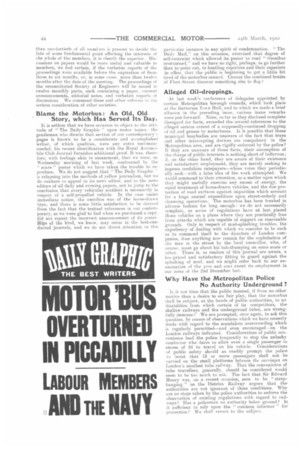Why Have the Metropolitan Police No Authority Underground ?
Page 2

If you've noticed an error in this article please click here to report it so we can fix it.
IN it not time that the public insisted, if from no other motive than a desire to see fair play, that the motorbus shall be subject, at the hands of public authorities, to no disabilities from which certain of its competitors, the shallow railways and the underground tubes, are wrongfully immune? We are prompted, once again, to ask this question, by reason of observations which we have recently made with regard to the scandalous overcrowding which is regularly permitted—and even encouraged—on the London railways indicated. Considerations of public convenience lead the police frequently to stop the unlucky conductor who dares to allow even a single passenger in excess of 34 to travel on his vehicle. Considerations of public safety should as readily prompt the police to insist that 13 or more passengers shall not be carried on the small platforms between the carriages on London's smallest tube railway. That the convenience of tube travellers, generally, should be considered would seem to be too much to ask. The fact that Sir Edward Henry was, on a recent occasion, seen to be "straphanging " on the District Railway argues that the authorities are not ignorant of these conditions. Why are no steps taken by the police authorities to enforce the observation of existing regulations with regard to railways? Has a policeman no authority below ground Is it sufficient to rely upon the " common informer " for protection ? We shall revert to the subject.






















